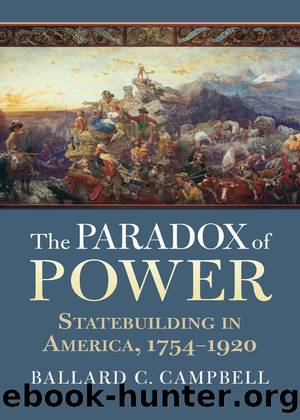The Paradox of Power by Ballard C. Campbell

Author:Ballard C. Campbell [Campbell, Ballard C.]
Language: eng
Format: epub
Tags: History, United States, Revolutionary Period (1775-1800), 19th Century, 20th Century
ISBN: 9780700632565
Google: 2TNszgEACAAJ
Publisher: University Press of Kansas
Published: 2021-01-15T03:10:39+00:00
The condition of a democratic state depends largely on the inhabitantsâ acceptance of the legitimacy of their leaders. During the Gilded Age political parties were the primary tool for marshaling popular support for governing regimes, with private groups such as religious organizations, commercial interests, labor and farmer groups, and publishing entities playing important supporting roles. After 1900 parties lost some of their hold on voter loyalty, while nonpolitical interests such as business groups, labor organizations, and citizensâ reform-oriented groups, as well as more assertive executives at all levels, assumed more influential leadership roles. These post-1896 shifts were evolutionary and incremental, however, and did not disturb the basic cultural and structural foundations on which the American national state rested.
The historical evidence suggests that a substantial majority of residents (adult citizens and aliens) accepted the principles that formed the nationâs ideological foundation. Clearly, the vast majority of Americans remained loyal to the national regime, in the sense that no violent (i.e., unconstitutional) revolution or palace coup occurred during the Gilded Age and Progressive Era. Support for the federal state rested heavily on a popular embrace of classic American tenetsâindividual rights, equality, and economic opportunityâas frayed as these principles were in practice. Numerous cultural groups and disgruntled labor activists were relegated to secondary status by white Protestant males. Where persuasion failed, power holders wielded coercive force to extract compliance from dissidents. Behind the celebration of political rights and individualism lurked the reality of American insistence on law and order, particularly for people of color and those with marginal incomes. The American state consisted of a noncentralized structure held together by popular consent for its democratic principles as articulated by the core cultural establishment, the competitive arrangement of its party system, and leadersâ willingness to force compliance from social and political deviants.
Download
This site does not store any files on its server. We only index and link to content provided by other sites. Please contact the content providers to delete copyright contents if any and email us, we'll remove relevant links or contents immediately.
| Americas | African Americans |
| Civil War | Colonial Period |
| Immigrants | Revolution & Founding |
| State & Local |
In Cold Blood by Truman Capote(3384)
The Innovators: How a Group of Hackers, Geniuses, and Geeks Created the Digital Revolution by Walter Isaacson(3206)
Steve Jobs by Walter Isaacson(2899)
All the President's Men by Carl Bernstein & Bob Woodward(2376)
Lonely Planet New York City by Lonely Planet(2226)
And the Band Played On by Randy Shilts(2209)
The Room Where It Happened by John Bolton;(2159)
The Poisoner's Handbook by Deborah Blum(2140)
The Innovators by Walter Isaacson(2105)
The Murder of Marilyn Monroe by Jay Margolis(2097)
Lincoln by David Herbert Donald(1988)
Being George Washington by Beck Glenn(1976)
A Colony in a Nation by Chris Hayes(1934)
Under the Banner of Heaven: A Story of Violent Faith by Jon Krakauer(1804)
Amelia Earhart by Doris L. Rich(1696)
The Unsettlers by Mark Sundeen(1687)
Dirt by Bill Buford(1678)
Birdmen by Lawrence Goldstone(1668)
Zeitoun by Dave Eggers(1651)
